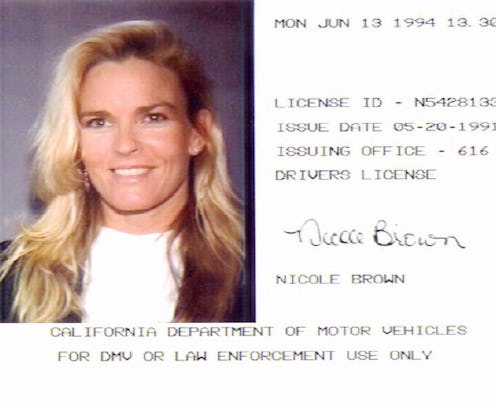With all of the pomp and circumstance surrounding the trial of O.J. Simpson that found him not guilty of the murders of Nicole Brown Simpson and Ronald Goldman, the two victims can devastatingly almost become an afterthought. But in The People v. O.J. Simpson: American Crime Story, the prosecution will bring the victims back into the forefront when they present evidence of domestic abuse of Nicole Brown Simpson. Although the first episode of the FX series had Sarah Paulson's Marcia Clark expressing her disgust at the abuse claims, viewers will now see her tell the story of Simpson and Brown's troubled past in court. And the evidence will show that Brown Simpson went to the hospital for injuries reportedly sustained from her husband one night, years before she was killed.
As American Crime Story previously noted, when Simpson and Brown Simpson were still married there were several reported incidents of domestic abuse and in the March 22 episode, "A Jury in Jail," Brown Simpson's hospitalization will be mentioned, which was the result of a terrifying incident. According to the New York Times, following a New Year's Eve party at the Simpson home in 1989, police reports stated that Simpson had beaten Brown Simpson so severely, she needed to seek medical attention at a hospital. According to the police report from that night, Brown Simpson had "a cut lip, a swollen and blackened left eye and cheek, and a hand imprint on her neck." The newspaper also reported that following this incident, Simpson "pleaded no contest to a charge of spousal abuse, and he was sentenced by a municipal judge to 120 hours of community service and two years' probation."
However, according to videotapes of Simpson's civil trial, he initially denied that such an altercation occurred. The New York Times reported that when shown photos of Brown Simpson from a 1989 incident, Simpson testified that they could've actually been makeup from a movie the two were working on. However, when asked if he ever hurt his wife, Simpson said, "I hurt my wife, yes," and then said that though he never punched her in the face, "I could’ve touched her neck, yes." The New York Times also reported that Simpson testified that he never struck, slapped, hit, kick, or beat Brown Simpson.
After responding to the 911 call on New Year's Eve, the Los Angeles Times reported that a bruised and battered Brown ran out of the bushes and screamed, "He's going to kill me. He's going to kill me." The paper went into more detail about the reports of what allegedly happened that night.
... Simpson had punched and kicked his wife and pulled her hair and screamed, "I'll kill you!" according to the documents. He had slapped her so hard, one police report said, that a handprint was left on her neck.
This was the ninth time police had been called to the Simpson residence for alleged domestic abuse and the Los Angeles Times wrote that one police report claimed that Simpson responded with hostility toward the arriving officers and said, "The police have been out here eight times before, and now you're going to arrest me for this? ... This is a family matter. Why do you want to make a big deal out of it when we can handle it?"
Robert Pingle, the deputy Los Angeles city attorney who worked on the 1989 case, told The New York Times in the previously mentioned article that he had recommended Simpson be sentenced to 30 days in jail and be required to attend a year-long intensive therapy group. Instead, Simpson was sentenced to the community service and therapy, where he was allowed to choose a psychiatrist of his choice — which was "characterized by domestic violence experts today as highly unusual and ineffective," according to the NYT.
Although the New Year's Eve event had been reported to the authorities and Brown was sent to the hospital, there were additional claims of abuse. Even after Brown and Simpson divorced, there were 911 calls from Brown in which she alleged that her ex-husband had broken into her house and was "going nuts," according to the Chicago Tribune. According to the New York Times' report of Simpson's civil trial testimony, he said of one such 911 call, "I will debate forever that she was not frightened."
While Simpson was eventually found not guilty of the murders, American Crime Story reminds audiences that he and Brown Simpson certainly had a volatile past.
